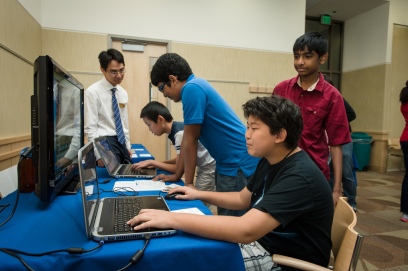 My initial response to Mitra’s experiments was “WOW, just WOW.” Mitra’s findings that learning “happens by itself” was interesting and relevant to the workings of the modern world. Children pick up on technology and how to use it with minimum input from teachers (or parents). Mitra’s experiment also strung together for me all EDUC 407 assignments to date, filling in the gaps by connecting:
My initial response to Mitra’s experiments was “WOW, just WOW.” Mitra’s findings that learning “happens by itself” was interesting and relevant to the workings of the modern world. Children pick up on technology and how to use it with minimum input from teachers (or parents). Mitra’s experiment also strung together for me all EDUC 407 assignments to date, filling in the gaps by connecting:
- Friedman’s claims in The World is Flat video that technology is making the world smaller, and third-world countries more competitive with the U.S.;
- Juárez Correa’s assertion in the Wired article, “A Radical Way of Unleashing a Generation of Geniuses,” telling impoverished students in Mexico City that “Potential” was “the one thing that makes you the equal of any kid in the world” and using technology to unleash it;
- My personal example in last week’s blog of how my son’s self-taught Coding Class allowed collaborating students to self-pace and self-learn a 10-week curriculum in a matter of only 3 weeks.
Mitra’s Experiments.  Children living in the far corners of Friedman’s flat world, in “those places where [good teachers] are needed the most;” those children who had NEVER been exposed to teachers, computers, internet, mouse nor the English Language in which the materials were presented, successfully “self-taught” themselves and their peers to use technological equipment, access the internet, search for information, and more impressively, comprehend it.
Children living in the far corners of Friedman’s flat world, in “those places where [good teachers] are needed the most;” those children who had NEVER been exposed to teachers, computers, internet, mouse nor the English Language in which the materials were presented, successfully “self-taught” themselves and their peers to use technological equipment, access the internet, search for information, and more impressively, comprehend it.
Wow, that was a mouthful. Here were kids in third-world countries, hungry to learn: they were ingesting morsels of technology and chomping at the bit for the next course; digesting chunks of information; circulating nutrients of knowledge essential to survive/function/grow in our technological world; and feeding their brains with the knowledge they absorbed.
Mitra’s hole-in-the-wall computer stations served appetizers to learning. Children in the far-reaches of the world could sample technology and get taste the smorgasbord of information available to them. They devoured it all, and in doing so, joined the rest of us at the world’s technological (and flat) table.
 Mitra was eliminating the wasted potentials of young minds.
Mitra was eliminating the wasted potentials of young minds.
“A mind is a terrible thing to waste.” – Motto of the United Negro College Fund
And now these children were cooking up new recipes for learning. A feast for the mind, indeed.
The results of Mitra’s experiments, how children “self-teach” with minimal guidance from a teacher, can be illustrated by my son’s current junior high school Coding class  (such as the one described by Friedman). As I described in my blog last week, my son’s teacher set the students free to explore and complete coding modules at their leisure. The result? The kids, left to self-pace and self-teach in small collaborative groups, completed 10-weeks worth of curriculum in a matter of 3-weeks time.
(such as the one described by Friedman). As I described in my blog last week, my son’s teacher set the students free to explore and complete coding modules at their leisure. The result? The kids, left to self-pace and self-teach in small collaborative groups, completed 10-weeks worth of curriculum in a matter of 3-weeks time.
These small collaborative groups working together are also seen in today’s classrooms and are a required element of the new Common Core Standards.
Mitra’s Current Findings in My Future Classroom. Mitra’s description of education as a “self-organizing system” and “emerging phenomenon” is important to note as a soon-to-be teacher to technologically savvy kids. I have always believed in allowing kids to push boundaries, especially in areas which interest them. I will achieve this by leading and guiding and interactive process of learning. Memorization is no longer needed; information is readily available by looking it up. It’s essential to allow them to pursue these endeavors.
 So I agree with Mitra and will practice his mantra in my classroom: “Knowing is becoming obsolete.”
So I agree with Mitra and will practice his mantra in my classroom: “Knowing is becoming obsolete.”
If it was also good enough for Einstein, it’s also good enough for me. When asked for his phone number, Einstein had to look it up.
“Why should I memorize anything I can so easily get from a book?” – Albert Einstein
And I wholeheartedly agree.

One of the issues with applying Mitra’s findings in the classroom are parents. Last year I had an upset parent contact wanting to know where her daughter’s homework was. It was the second day of of her daughter’s first grade year. Another parents disagreed with my policy of not allowing students to interrupt my small group time with anything other than an emergency. Most parents I have spoken to dislike common core without seeing it or researching it. I’m not saying that it will be impossible to incorporate Mitra’s findings in the classroom, but that it will be a slow process.
LikeLike
Which grades/subjects are you teaching? And what are your opinions on CC?
LikeLike
It is certainly interesting to observe the way these three phenomena all contribute to the idea of technology in a classroom setting and it is exciting to be at the forefront of such a changing world. I do not know if I agree that knowledge is obsolete and that memorizing “anything” is now unnecessary. There are plenty of things that are helpful to memorize, especially as a teacher, in order to be credible. I was talking with an acquaintance the other day who found out I was an English major and that I love poetry. The first thing she asked after finding out was, “can you recite any poetry?” I did not have my phone on me to be able to look up any poetry, but with a smile, said “why, yes I have my favorite poem memorized actually,” and was able to recite it. What is the purpose or benefit of this? Simply that art is beautiful and we both enjoyed a poetry recitation together which sparked further conversation (nerdy, yes I know). I am just trying to advocate for art. Simply because something is not necessary, does not mean it should be cut out. The same goes for the memorization of knowledge, at least in my opinion. Of course, I could be wrong, especially because Albert Einstein had a bit more experience with knowledge than me, I will admit!
LikeLike
Q for you: did you memorize this poem because you were personally drawn to it? (What is your favorite poem, btw?) or were you were required to memorize it per a curriculum?
If you memorized the poem because it inspired and interested you, then you did act in the Mitrarian-mindset: you self-taught/learned it on a deeper level than a required recitation of words (short-term memorization) because some chord of inspiration was stuck within; this caused used you to explore more deeply the poems’s emotions, meaning, substance, structure, etc. beyond the “words” which afforded a greater application, appreciation and understanding (long-term learning).
So the kid two rows over and three desks up who memorized it that same week with you has likely forgotten the poem; but because you were interested in, and explored it further, you apply a greater background knowledge and can likely offer original thoughts and interpretations on the subject. Further investigation on your part made this poem more meaningful on many levels, and therefore memorable.
So in my opinion, it wasn’t the memorization which was helpful per say; but the learning which resulted thereafter.
Check out this link re: Memorization vs Learning.
Click to access Memorizing_and_Learning.pdf
LikeLike